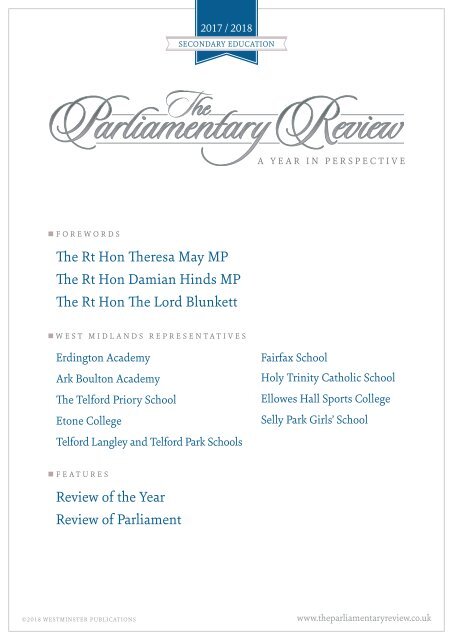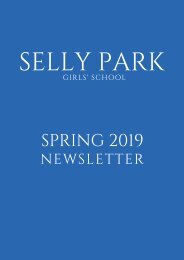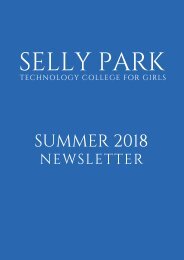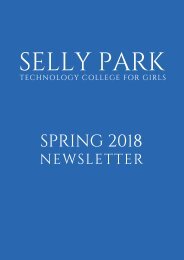Parliamentary Review
Create successful ePaper yourself
Turn your PDF publications into a flip-book with our unique Google optimized e-Paper software.
2017 / 2018<br />
SECONDARY EDUCATION<br />
A YEAR IN PERSPECTIVE<br />
FOREWORDS<br />
The Rt Hon Theresa May MP<br />
The Rt Hon Damian Hinds MP<br />
The Rt Hon The Lord Blunkett<br />
WEST MIDLANDS REPRESENTATIVES<br />
Erdington Academy<br />
Ark Boulton Academy<br />
The Telford Priory School<br />
Etone College<br />
Telford Langley and Telford Park Schools<br />
Fairfax School<br />
Holy Trinity Catholic School<br />
Ellowes Hall Sports College<br />
Selly Park Girls’ School<br />
FEATURES<br />
<strong>Review</strong> of the Year<br />
<strong>Review</strong> of Parliament<br />
©2018 WESTMINSTER PUBLICATIONS www.theparliamentaryreview.co.uk
Foreword<br />
The Rt Hon<br />
Theresa May MP<br />
Prime Minister<br />
British politics provides ample material for analysis in the<br />
pages of The <strong>Parliamentary</strong> <strong>Review</strong>. For Her Majesty’s<br />
government, our task in the year ahead is clear: to<br />
achieve the best Brexit deal for Britain and to carry on<br />
our work to build a more prosperous and united country<br />
– one that truly works for everyone.<br />
We have already made good progress towards our goal<br />
of leaving the EU, so that we take back control of our<br />
laws, money and borders, while negotiating a deep and<br />
special partnership with it after we have left that is good<br />
for jobs and security. The EU Withdrawal Act is now on<br />
the statute books to provide legal certainty at the point<br />
of exit. We have reached agreement on protecting the<br />
rights of EU citizens living here in the UK and British<br />
citizens living in the EU, on an implementation period to<br />
give businesses time to prepare, and on a fair financial<br />
settlement. We are now pressing ahead to reach an<br />
agreement with the EU on our future relationship that<br />
honours the result of the EU referendum and sets the<br />
UK on course for a prosperous future.<br />
That is why we have set an ambitious goal of lifting UK<br />
public and private research and development investment<br />
to 2.4 per cent of gDP by 2027.<br />
I believe that Britain can look to the future with<br />
confidence. We are leaving the EU and setting a new<br />
course for prosperity as a global trading nation. We have<br />
a Modern Industrial Strategy that is strengthening the<br />
foundations of our economy and helping us to seize the<br />
opportunities of the future. We are investing in the public<br />
services we all rely on and helping them to grow and<br />
improve. Building on our country’s great strengths – our<br />
world-class universities and researchers, our excellent<br />
services sector, our cutting edge manufacturers, our<br />
vibrant creative industries, our dedica ted public servants<br />
– we can look towards a new decade that is ripe with<br />
possibility. The government I lead is doing all it can<br />
to make that brighter future a reality for everyone in<br />
our country.<br />
getting the right Brexit deal is essential; but it will not<br />
be sufficient on its own to secure a more prosperous<br />
future for Britain. We also need to ensure that our<br />
economy is ready for what tomorrow will bring. Our<br />
Modern Industrial Strategy is our plan to do that.<br />
It means government stepping up to secure the<br />
foundations of our productivity: providing an education<br />
system that delivers the skills our economy needs,<br />
improving school standards and transforming technical<br />
education. It is all about taking action for the long-term<br />
that will pay dividends in the future.<br />
But it also goes beyond that. government, the private<br />
sector and academia working together as strategic<br />
partners achieve far more than we could separately.<br />
“<br />
Providing an education<br />
system that delivers the<br />
skills our economy needs,<br />
improving school standards<br />
and transforming technical<br />
education<br />
“<br />
FOREWORD | 1
Foreword<br />
The Rt Hon<br />
Damian Hinds MP<br />
Secretary of State for Education<br />
If you had asked me last year where would I most like to<br />
work, I would not have hesitated: education. nothing is<br />
more important than helping children to discover a love<br />
of learning and to leave school happy, well rounded and<br />
with all the qualifications they need for whatever they<br />
want to do. That is what England’s 450,000 teachers<br />
are devoted to.<br />
I have spent my first months as education secretary visiting<br />
as many nurseries, schools, colleges and universities as<br />
possible and seeing for myself the contribution offered<br />
and challenges faced by our early years professionals,<br />
teachers and lecturers. They are the ones in the front<br />
line of our drive to improve education for every child.<br />
My mission is for every child to have a world-class<br />
education and the chance to fulfil their potential,<br />
whatever their background. Thanks to the hard work of<br />
heads and teachers we’ve made huge progress.<br />
Since coming into government in 2010, 1.9 million<br />
more children are being taught in good or outstanding<br />
schools - representing 86 per cent of pupils compared to<br />
66 per cent in 2010. Since the phonics screening checks<br />
were introduced, 154,000 more six year olds are on<br />
track to become fluent readers; and we have seen the<br />
attainment gap narrow by at least ten per cent at both<br />
primary and secondary school.<br />
We have reformed gCSEs, creating a new gold standard<br />
in qualifications, and A levels to better prepare students<br />
for university. Record numbers of disadvantaged 18 year<br />
olds are now going to university for full-time study.<br />
These are real tangible achievements that we will build<br />
on as we continue to improve the education that every<br />
child receives.<br />
“<br />
But in providing that education, I know that the most<br />
important factor is the person at the front of the<br />
classroom. I want this to be a profession which draws<br />
the best, most gifted and committed teachers and then<br />
develops and keeps them.<br />
However, it’s clear too many teachers are having to<br />
cope with a workload that makes huge demands of<br />
them before they even set foot inside the classroom.<br />
Working with Ofsted, we are challenging excessive and<br />
unnecessary marking and data collection, as well as<br />
reforming our accountability system to make sure good<br />
schools are not burdened by multiple inspections and<br />
multiple demands for data. This will free up teachers to<br />
do what they came into the profession to do: teach.<br />
One of the most important ways government can<br />
improve education is to give great schools the freedom<br />
to innovate and, then, to share their ideas and best<br />
practice. I’m pleased this year’s <strong>Parliamentary</strong> <strong>Review</strong><br />
gives a platform to some brilliant and innovative schools.<br />
I look forward to continuing to work with this whole<br />
sector so we can make sure every child, in every<br />
classroom, can fulfil their potential.<br />
One of the most important<br />
ways government can<br />
improve education is to give<br />
great schools the freedom<br />
to innovate<br />
“<br />
2<br />
| FOREWORD
Foreword<br />
The Rt Hon<br />
The Lord Blunkett<br />
Secretary of State for Education and<br />
Employment (1997-2001) and<br />
Co-Chairman, The <strong>Parliamentary</strong> <strong>Review</strong><br />
This summer has been a very unusual time for many<br />
young people and their parents. Unusual, not because<br />
of the nerve-wracking wait for examination results that<br />
takes place each year but because this is the first set of<br />
full results since the process was changed substantially.<br />
Very simply, instead of A* to C grade as a judgment<br />
of academic ability to move on to post-16 education,<br />
as opposed to a vocational route, a 1 to 9 scale is<br />
now in place, with nine being akin to an A*, although<br />
judgment on exact comparators is very difficult.<br />
Final exams, without the previous assessment process,<br />
will benefit those who have an extremely good retentive<br />
memory. I did, when I undertook my own qualifications<br />
in my six-year battle to get the qualifications to go to<br />
university. Others aren’t so fortunate.<br />
So, in the Labour Party’s review of the present education<br />
system, there are many strands to pull together. My own<br />
review on behalf of the previous leader of the Labour<br />
Party back in 2014 was very much about how to reinforce<br />
partnership and collaboration, concentrating on standards<br />
and action in the classroom rather than structures.<br />
The national Audit Office estimate that around £745 million<br />
has been spent over recent years on academisation<br />
of schools. For some, this has resulted in the change<br />
needed, the boost required to bring about substantial<br />
improvements. For the system as a whole, according to<br />
the Office for Standards in Education, fragmentation and<br />
“atomisation” has led to a very mixed picture.<br />
In Labour’s manifesto for the election in June last year,<br />
a promise was given that there would be a national<br />
Education Service. While this clearly cannot mean<br />
centralising decision-making in Whitehall, equality of<br />
opportunity and a relentless drive from the centre to<br />
improve standards would be welcome. But for me, the truly<br />
“big” idea is to place further emphasis on lifelong learning.<br />
It is self-evident, not least in the responses from business,<br />
that a greater emphasis on technical education is needed.<br />
The so-called T Levels have proved extremely difficult<br />
to scale up from a small pilot. The Apprenticeship Levy,<br />
which is a good idea, has been handled with a degree of<br />
stubbornness which beggars belief. Why not redistribute<br />
the substantial underspend to those businesses willing<br />
to implement positive change?<br />
It is the world of tomorrow that both major political<br />
parties should be addressing. The development of<br />
robotics and the implications of geo-political change, not<br />
least in the replacement of oil as a key driver of industrial<br />
and transport needs, all bring very real challenges.<br />
At its simplest, we’re talking about a further wave of<br />
economic, industrial and social upheaval. We’ve all talked<br />
a lot about this, but preparation for the seismic change<br />
which is coming is significant only by its absence.<br />
While children aged 10 and 11 struggle with the exact<br />
name of a particular type of verb, the world is passing<br />
us by. In the post–Brexit era, it is a revolution not just<br />
in the delivery of the basics in the classroom, necessary<br />
as that is, but also a vision of the kind of education for<br />
and throughout life, which liberates the talent of each<br />
individual, and addresses the economic needs of the<br />
nation and the challenge of global competition.<br />
Let us hope that both the Labour and Conservative<br />
frontbench can move beyond the structural tinkering<br />
and political meddling, into something worthy of Britain<br />
in the mid-21st century.<br />
FOREWORD | 3
Andrew neil<br />
Economy thrives while politics divides<br />
It’s been over two years since the<br />
country voted to leave the European<br />
Union, but Brexit continues to<br />
hang over British politics like an<br />
all-encompassing dark, brooding<br />
cloud, discombobulating established<br />
relationships and upturning<br />
traditional verities wherever we look.<br />
Social class no longer largely<br />
determines how you vote in the UK.<br />
The latest polls suggest the Tories<br />
now enjoy a lead among workingclass<br />
voters. They’ve always won<br />
a chunk of working class votes –<br />
Disraeli called them his “Angels in<br />
Marble” – but never a majority.<br />
As for Labour, even under its<br />
most left-wing leader ever, it now<br />
garners considerable support among<br />
the professional middle classes,<br />
especially in the major metropolitan<br />
conurbations.<br />
The reason for this psephological<br />
seachange is Brexit. If you voted<br />
Leave, you are now more likely to<br />
vote Tory; if Remain, Labour.<br />
Brexit is now the dividing line within<br />
Labour and the Conservatives. It splits<br />
the cabinet and shadow cabinet,<br />
backbenchers of both parties and<br />
their voters in the country. The Tory<br />
divisions are more obvious to see<br />
because they are the governing party<br />
and make big news. But Jeremy<br />
Corbyn has managed to lose 103<br />
frontbenchers, often through Brexitrelated<br />
resignations, which doesn’t<br />
quite have the impact of Boris Johnson<br />
or David Davis walkouts, but must be<br />
something of a record nevertheless.<br />
Brexit has also induced something of<br />
rigor mortis on both frontbenches.<br />
For nearly all of the past<br />
parliamentary year, cabinet ministers<br />
and leading Labour spokespeople<br />
have been unable to answer the<br />
simplest questions on our post-Brexit<br />
4 | ANDREW NEIL<br />
state when it comes to the customs<br />
union, the Irish border, immigration<br />
policy and the single market. Only<br />
recently, with the Article 50 deadline<br />
looming, has some clarity emerged<br />
– and not always. I believe this<br />
widespread prevarication has added<br />
to voter disillusion.<br />
Just as important, nearly all non-<br />
Brexit matters have been swept<br />
into a Brexit-induced Bermuda<br />
Triangle. This is understandable. But<br />
it has added to the gulf between<br />
parliament and the people.<br />
The impact of Brexit on the<br />
parliamentary process has been<br />
generally unpredictable and often<br />
amusing. Left-wing Remainers now<br />
speak of the House of Lords as a<br />
bastion of democracy. Right-wing<br />
Leavers sound increasingly like<br />
peasants with pitchforks, determined<br />
to bring the whole edifice of the<br />
upper house tumbling down.<br />
Jeremy Corbyn, who’s spent his<br />
political career railing against the<br />
iniquities of the market economy,<br />
now poses as the champion of<br />
business (up to a point). Brexiteer<br />
Tories regularly mutter anti-business<br />
sentiments in unprintable language.<br />
Overarching all this turmoil and<br />
uncertainty, as I explained in<br />
The <strong>Parliamentary</strong> <strong>Review</strong> last year,<br />
is the resurgence of the twoparty<br />
system in England, another<br />
consequence of Brexit. At the 2017<br />
general election, the Leaver Right<br />
collapsed into the Tories and the<br />
Remainer Left flocked to Mr Corbyn’s<br />
Labour party. It is beyond strange that<br />
the two main parties should be doing<br />
so well when many regard them<br />
as weaker, less talented and more<br />
divided than they’ve been in living<br />
memory. But they got easily over 80<br />
per cent of the English vote between<br />
them in 2017 and all polls since<br />
suggest that is the new status quo.<br />
The fundamental parliamentary<br />
fact in this post-referendum era is<br />
that there is no majority for what<br />
hardliners on either side of the Brexit<br />
divide would like. So, when it comes<br />
to determining the eventual shape<br />
of Brexit, parliament is very much in<br />
the driving seat, as the government<br />
has found out the hard way.<br />
The problem is it’s not sure what<br />
parliament wants that shape to be.<br />
Business might despair at what it<br />
sees as an increasingly dysfunctional<br />
political system. But it should<br />
take comfort from the fact that<br />
economics and politics are, for the<br />
moment, going their separate ways.<br />
no matter how much you might<br />
think politicians are mucking it up,<br />
the economy in general and business<br />
in particular continue to defy them.<br />
I have thought for sometime that<br />
business and the economy are in<br />
much better shape than established<br />
opinion would have it. There were<br />
signs in the early summer of 2018<br />
that this was indeed the case. But,<br />
by the time you read this, you’ll have<br />
a much better idea if I’m right. Keep<br />
your fingers crossed – not for my<br />
sake, but for the country’s!<br />
neil believes the two-party system<br />
is the new status quo
SECONDARY EDUCATION<br />
Selly Park Girls’ School<br />
Supporting progress in art<br />
Head teacher Lisa Darwood<br />
Selly Park Girls’ School provides an outstanding education<br />
to its pupils. Despite 60 per cent of pupils receiving the<br />
pupil premium and 76 per cent having English as an<br />
additional language, the school continues to thrive. As well as<br />
Ofsted designating it an “outstanding school”, achievement<br />
and progress are at consistently high levels. The school is proud<br />
of its history and its beautiful, ornate Victorian buildings, which<br />
are complemented by recently built modern, state-of-the-art<br />
facilities. Lisa Darwood, head teacher, discusses the school’s<br />
vision and the challenges it faces, the successes pioneered<br />
using pupil premium, the school’s international links, and its<br />
strategic plans.<br />
REPORT CARD<br />
SELLY PARK GIRLS’ SCHOOL<br />
»»<br />
Head teacher: Lisa Darwood<br />
»»<br />
Founded in 1911<br />
»»<br />
Based in Birmingham<br />
»»<br />
Type of school: Community<br />
secondary girls’ school<br />
»»<br />
No. of students: 686<br />
»»<br />
Ofsted: “Outstanding”<br />
»»<br />
www.sellyparkgirls.org<br />
Introduction<br />
On behalf of the students, staff and governors, I would like to welcome you to<br />
Selly Park Girls’ School. Our school is known for its high expectations, academic<br />
success, first-class education and its innovative approach. Our vision and values<br />
underpin all that we do. Indeed, everyone who knows us or visits our school speaks<br />
of our distinct ethos. Our core belief is that the most effective education is when<br />
teachers and parents work together in a genuine partnership, which results in our<br />
students being proud of their personal achievements. Our hard-working students<br />
are imbued with a sense of purpose and determination and boast some of the best<br />
progress rates in the city, despite hailing from some of the most disadvantaged<br />
wards in Birmingham.<br />
“<br />
Our students<br />
become<br />
upwardly mobile<br />
after feeling<br />
empowered by<br />
the education<br />
they receive<br />
“<br />
SELLY PARK GIRLS’ SCHOOL |<br />
33
“<br />
THE PARLIAMENTARY REVIEW<br />
Highlighting best practice<br />
Developing skills<br />
We are uncompromising<br />
in<br />
our ambition<br />
and our hardworking<br />
students boast<br />
some of the<br />
best progress<br />
rates in the<br />
city<br />
“<br />
Inspirational teaching<br />
and inquisitive students<br />
Vision<br />
The success of Selly Park Girls’<br />
School is built on four key pillars:<br />
inspirational teachers, aspirational<br />
pupils, engaged stakeholders and a<br />
vibrant environment. Our forwardthinking<br />
governors work closely with<br />
our dynamic senior leadership team<br />
and focus on consistently improving<br />
outcomes for all pupils – we are<br />
uncompromising in our ambition. Our<br />
inspiring teachers are complemented<br />
by our support staff in helping our<br />
pupils to achieve the highest grades<br />
and make excellent progress. Being<br />
a relatively small secondary school<br />
benefits our pupils: we know them<br />
individually, their strengths and areas<br />
for development, and this results in<br />
the provision of our highly effective<br />
programme of interventions and<br />
targeted support with which pupils<br />
actively engage.<br />
Living out our aims to help<br />
the disadvantaged and<br />
increase social mobility<br />
Selly Park is a microcosm of<br />
multicultural Birmingham and we<br />
are proud of our diverse student<br />
population. Many ethnic groups attend<br />
the school and enjoy harmonious<br />
relationships. Initiatives such as<br />
Unicef’s Rights Respecting embed the<br />
notion that children are valued and<br />
can thrive in a safe and protective<br />
environment. Attainment and progress<br />
for the disadvantaged is well above<br />
the national average. Our students<br />
become upwardly mobile after<br />
feeling empowered by the secondary<br />
education they receive.<br />
Winners of Pupil Premium<br />
Award<br />
It is no surprise that we were the<br />
winners of the coveted SSAT Pupil<br />
Premium Award for the Midlands<br />
(2014, 2015, 2016 and 2017). Not<br />
only was the high attainment and<br />
exceptional progress applauded, but<br />
the excellent range of opportunities<br />
afforded to disadvantaged students<br />
was also remarked upon. In July 2018,<br />
we were also awarded ‘Secondary<br />
School of the Year’ at the Education<br />
Awards, the award identifies and<br />
celebrates establishments, people<br />
and organisations that go above and<br />
beyond to promote excellence within<br />
the education System. We ensure<br />
students have the crucial life skills<br />
that allow them to be global citizens.<br />
In addition, the school runs a very<br />
well-attended Saturday school which<br />
supports Key Stage 4 students in their<br />
quest for success.<br />
34 | SELLY PARK GIRLS’ SCHOOL
SECONDARY EDUCATION<br />
An exciting and expansive<br />
curriculum<br />
In supportive but robust departmental<br />
reviews, heads of department are<br />
coached and encouraged to provide<br />
an outstanding curriculum for our<br />
students. At Selly Park, we believe that<br />
the curriculum should be challenging<br />
and rigorous, but also rich in depth<br />
and breadth and ultimately enjoyable.<br />
Whereas some schools are narrowing<br />
their curriculum, I am proud to report<br />
that nearly two-thirds of our Key Stage<br />
4 students are entered for the English<br />
Baccalaureate, enjoying languages as<br />
diverse as Urdu, Arabic and Russian.<br />
We are also committed to offering an<br />
exciting extracurricular programme.<br />
Recent excursions include art trips<br />
to the Oxford galleries, the Equality<br />
and Diversity residential trip to our<br />
national link school in the Lake District<br />
as well as various trips to theatres and<br />
museums. The music department also<br />
works in partnership with the National<br />
Youth Orchestra of Great Britain and<br />
the Royal Birmingham Conservatoire<br />
and we provide free music tuition for<br />
all our pupils. The history department<br />
marked the recent centenary of the<br />
school by viewing rare primary sources<br />
in the form of the school diaries and<br />
letters written first-hand. As well as<br />
Science Club, which is run with the<br />
help of STEM ambassadors from the<br />
University of Birmingham, the school<br />
is also linked with the Brilliant Club at<br />
the University of Warwick.<br />
International links<br />
I am perhaps most proud of our<br />
international links and we are recipients<br />
of the International School Award. We<br />
are also an Expert Centre for the Global<br />
Learning Programme. We remain<br />
determined to be outward looking and<br />
retain a global dimension. We give<br />
pupils the opportunities to develop<br />
an appreciation of the diversity and<br />
richness of worldwide cultures, so they<br />
become global citizens and can thrive<br />
in an ever-changing world through<br />
their appreciation of meaningful links<br />
with schools locally, nationally and<br />
internationally. Together, the school has<br />
enjoyed visits to a wide range of places<br />
across the four corners of the globe and<br />
we have visited our long-established<br />
links with schools in Ghana and<br />
Zimbabwe this year. Personally, I have<br />
taken pupils to South Africa where<br />
they have delivered at the IAPESGW<br />
World Congress Meeting on the topic<br />
“Muslim girls’ participation in physical<br />
activity”. Over the last few years, we<br />
have hosted international dignitaries.<br />
Moreover, we have an International<br />
Staff and Pupil Council, which ensures<br />
that the global dimension is truly<br />
embedded in our curriculum.<br />
The future of Selly Park<br />
We have plans to expand the school’s<br />
roll over the next five years in a<br />
sensitive and sustainable fashion. We<br />
are intent on retaining the benefits<br />
of a small school as it allows us to<br />
prioritise the individual needs of our<br />
students. We will continue to have<br />
high aspirations and expectations for<br />
all our pupils and aim to develop not<br />
only their academic success but also<br />
relationships, which are characterised<br />
by kindness, tolerance, helpfulness and<br />
respect. Our doors are always open,<br />
and we would be proud to share our<br />
success story to any interested visitors.<br />
“<br />
International theme day<br />
Selly Park is a<br />
microcosm of<br />
multicultural<br />
Birmingham<br />
Striving for success<br />
“<br />
SELLY PARK GIRLS’ SCHOOL |<br />
35














